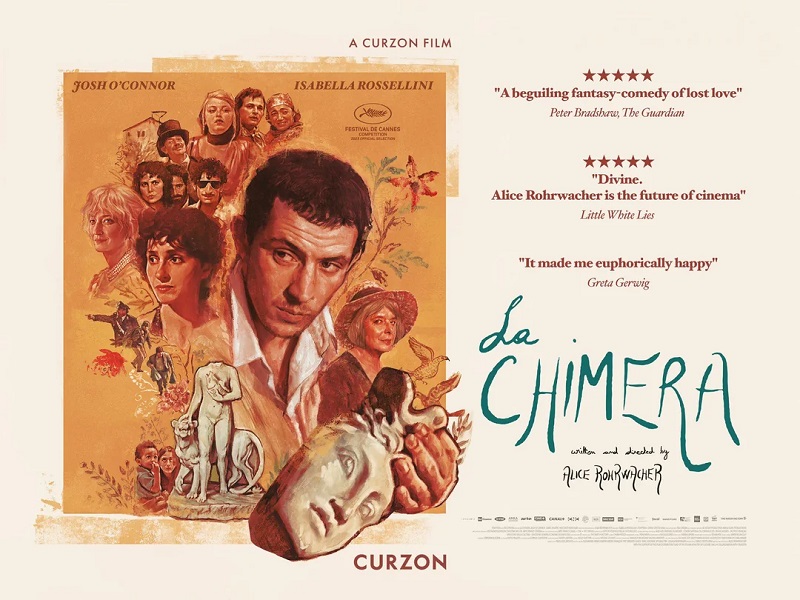
Review by
Eric Hillis
Directed by: Alice Rohrwacher
Starring: Josh O'Connor, Carol Duarte, Vincenzo Nemolato, Alba Rohrwacher, Isabella
Rossellini

Italian filmmakers have long had a unique ability to make the nonsensical
profound, but also to make profundity nonsensical. This curious dichotomy
is evident in Alice Rohrwacher's La Chimera, an insightful yet silly movie that's unapologetically Italian in its
disdain for narrative cohesion and its favouring of flavour and feeling.
I'm not entirely sure if it's a "good" movie, but it's one that's easy to
get lost in. It has the chaotic, disruptive energy of a Lambretta ridden
at full speed through a herd of sheep. That, in my book, is a good
thing.

This very Italian film is ironically centred on an Englishman. Arthur (Josh O'Connor) is an archaeologist who has somehow ended up using his skills for
nefarious means in 1980s Tuscany. With the aid of a divining rod he can
locate buried Etruscan treasures. This gift doesn't seem to have proven
profitable however, as he lives in a shack on the edge of the estate of
Flora (Isabella Rossellini), a doting elderly aristocrat whose
daughter, Beniamina (Yile Vianello), Arthur was once romantically involved with. The
movie is peppered with flashbacks of a beatific Beniamina in the manner
of Kevin Costner's recollections of Suzy Amis in Fandango, another movie about a sullen loner leading a ragtag group in digging
up treasure of sorts. Perhaps it's because he has to share his
ill-gotten gains with the various hangers on who make up Arthur's
unstable round table, not to mention how he's paid a relative pittance
by Spartaco, a shady unseen buyer in the city who knows Arthur has
nowhere else to go with his pilfered loot.
Arthur's talent doesn't seem to have brought him much joy either. He
walks around with a hangdog expression in an increasingly grubby white
suit, like the protagonist of a Graham Greene novel, snapping at
everyone he meets like a street dog that's been kicked by one passerby
too many. He does however appear to brighten up in the sunny presence of
Italia (Carol Duarte), a young woman who is hiding her two
children in the home of Flora, for whom she works as a free housekeeper
while ostensibly taking singing lessons. The movie never addresses this,
but Duarte is a Brazilian actress (best know for her stunning turn
in The Invisible Life of Euridice Gusmao) and with her mixed-race infant son we might suspect Italia is an
immigrant who has chosen that name in an over-reaching attempt to fit
in. Regardless of her origins, she's as much of an outsider as Arthur
here, and she provides the film with its heart. We can tell she's been
beaten down by life just as much if not more than Arthur, but her
positive outlook stands in stark contrast to his woe-is-me countenance.
Kicked out of Flora's home when her children are discovered, Italia
moves into a decrepit, defunct railway station which with the aid of
some fellow squatters, she turns into a home. While Arthur is plundering
Italy's history for profit, Italia is using it to build a life. It's the
difference between immigration and colonialism.

This is one of the few subtle points made in Rohrwacher's film, which
is often guilty of ladling its scorn for men like Arthur with a spoon as
deep as the Etruscan vases he digs out of the ground. In case we didn't
get the point that stealing is bad, Rohrwacher has characters sing songs
with lyrics that make it clear how she feels; others break the fourth
wall with a wrecking ball; and in one particularly cheesy moment, Arthur
has a nightmare in which random Italians he has previously met ask him
what happened to their artefacts, as though he robbed their very
homes.
At times the general realism is broken by some decidedly odd but
undeniably ballsy choices, like speeding up scenes of Arthur and his not
so noble knights being chased by the cops, as though it's the closing
scene of an episode of Benny Hill or a Monkees montage. The mysterious Spartaco is straight out of a 1960s spy
movie, only short of stroking a cat on their lap.

I'm unconvinced if it all really amounts to anything substantial,
but La Chimera is often intoxicating, the sort of movie that makes you feel like
you're on an adventurous holiday. O'Connor and Duarte are a pair of
beguiling stars and despite whatever disdain we might hold for Arthur we
can't help but root for their romance, which we suspect might shake the
Englishman out of his stupor. But men are idiots when it comes to
realising that sometimes the real treasure is right in front of
us.

La Chimera is on MUBI UK now.

